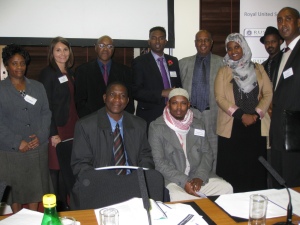
RUSI Somalia Roundtable report - London
London (Sunatimes) Kenya’s incursion into Somalia will affect people’s willingness to plant seeds and there is a potential humanitarian consequence says Mark Bowden, the UN resident and humanitarian coordination and UNDP resident representative for Somalia.
Mr Bowden added that the Humanitarian crisis in Somalia could remain until July next year with further internal displacement and migration.
The UN official has painted a bleak picture of Somalia’s political and humanitarian crisis. He was speaking at aRUSISomalia Roundtable.RUSIstands for Royal United Services Institute hosted in partnership with the Brenthurst Foundation of South Africa.
This meeting brought together “key Somali, regional and international stakeholders to discuss the key developments in Somalia and the region, and the prospects for stability, security and development for this decade.” saidRUSI.
SOMALI GOVERNMENT
It was a high level meeting with mostly up-to-date presentation provided by Somali government officials: Abdirahman Omar Osman, the Spokesman for Somali Transitional Federal Government and the former deputy prime minister of Somalia, Mohamed Abdullahi Omaar currently an MP in Somali parliament.
Although, one would think the two officials would defend the government by any means. It is the former prime minister, Mohamed Omaar who sighted, among other factors, leadership failure and monopolisation of power by very small groups, as the
main problems of Somalia.
The government spokesman, Abdirahman Omar, on the other hand focused on the government’s victory against al-Shabab, an alleged ‘terrorist’ group in Somalia. He defended Kenya troops entering Somalia by arguing Somali government later agreed and Kenya troops will leave Somalia when ‘it is no longer necessary’.
The Chair of the meeting, Dr Knox Chitiyo ofRoyal United Services Institute, has said Somalia’s “solution lies with Somali people”.
The RUSI round table meeting discussed a wide variety of Somali issues such as, security, terrorism, political stability, Kenya’s recent incursion in Somalia, humanitarian situation and piracy.
There seemed to be a consensus that Somalis should lead the solution for the prolonged instability in their nation with assistance from the international community.
Most speakers appeared to be very frank in their presentations and Q&A, which was officially off the record, although nothing different sprung up from the Q&A. Even if they were, I could not share them public, as that is breach of trust and deception.
The Head ofUNDP Somalia, Mark Bowden said the three causes of Somalia’s conflict are:
- Primarily economic.
- 2. Societal change taking place
- 3. Increased religious dimension to conflict
In terms of humanitarian assistance, he said that up to 1.8 million Somalis are getting food aid. He mentioned that up to 23 UN agencies or activities are operating in Somalia, and overall aid currently reaches 1.8 billion dollars.
However,Mark Bowdenpointed out the problems and challenges that humanitarian aid faces with the emergence of groups that are “gate keepers” meaning those who open up camps and do not let internally displaced people leave and that violence against these people increased in Mogadishu.
BACKGROUND
Somalia has been in turmoil, political conflict or civil war since January, 1990 when the former president that ruled the country for 21 years was ousted by armed tribal groups, the civil war that ensued never stopped, even with foreign intervention with the likes of: US, UN, Ethiopia, AU and now Kenya.
Somalia’s situation is complex. Conflicting national, regional and international interests, lack of leadership, tribal beliefs among other factors can be sighted as the main contributors to the two decades instability in Somalia.
By Abdirahman Koronto
Leave a comment
| Copyright © 2009 - 2025 Sunatimes News Agency All Rights Reserved. |
| Home | About Us | Diinta | Reports | Latest News | Featured Items | Articles | Suna Radio | Suna TV | Contact Us |
 0
0 












RUSI Somalia Roundtable report - London
Journalist Abdirahman Koronto who was at the Roundtable discussion has published a report